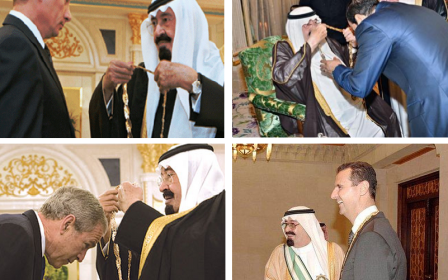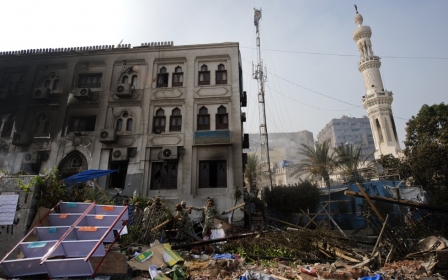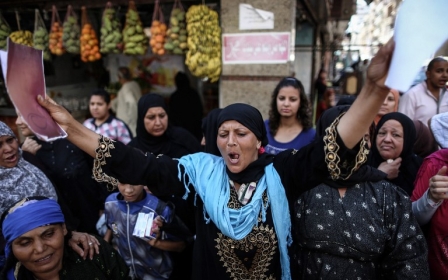Egypt's Sisi in France to discuss regional crises

Egyptian President Abdel Fattah al-Sisi begins a two-day trip to France on Wednesday, in the second leg of his first European tour as head of state.
The tour aims at bringing Egypt out of the diplomatic cold, after he oversaw a crackdown that damaged Cairo's international reputation.
Sisi was due to hold talks with French counterpart Francois Hollande later on Wednesday, likely to focus on the chaos in Libya as well as bilateral economic cooperation.
Ahead of the trip, French officials were at pains to stress the importance of Egypt as a regional player, despite the condemnation that followed Sisi's overthrow of his elected Islamist predecessor Mohamed Morsi and a deadly crackdown on opponents.
"Yes, we consider Sisi to be legitimate. But there's a lot to talk about," said a source close to Hollande, who declined to be named.
Egypt is a "great country and a big partner for France.”
Sisi arrives from Italy, where he was hailed as a "strategic partner" of Rome and Europe, in the latest sign of Cairo's international rehabilitation.
This is partly due to shared problems and enemies, notably the threat posed by Islamic State as well as lawlessness in Libya.
Sisi hopes to coordinate an international response to fighting between government-backed troops and Islamist militias in Libya.
French premier Hollande has described Libya's descent into chaos after the 2012 overthrow of Moamer Kadhafi as his "major concern," sounding the alarm over what Paris has termed a "terrorist hub.”
The Egyptians "have the feeling that they weren't heard in 2011 when they warned of the dangers of a Western intervention. They hope to be heard today," said a French government source.
"They believe we need to re-intervene in Libya, but we doubt that this crisis can be solved purely by force," added the source.
Egypt and France discuss arms sales
Hollande and Sisi will also talk business, with France hoping to sell Mirage 2000 combat jets to the Egyptian military.
French shipbuilder DCNS has already signed a contract estimated at one billion euros ($1.24 billion) to supply four Gowind-class Corvettes to Egyptian forces.
"This deal opens doors because it is prompting enormous interest in the Gulf countries," a French government source said.
A deal to develop the metro system in Cairo is also likely to be signed, and the second day of the trip will see the Egyptian delegation meet top French business officials.
But the issue of human rights will not be left unspoken, stressed Paris.
"We are aware of tensions, of journalists imprisoned and repression which goes well beyond the fight against terrorism," said a French source.
Amnesty International France called on the French authorities not to sell weapons to Cairo because of human rights concerns.
Report finds sit-in leaders responsible for Raba’a massacre
Sisi’s visit coincided with the release of a new report into events since 30 June 2013, when Muslim Brotherhood President Mohammed Morsi was deposed.
Morsi’s ouster, and the bloody crackdown that followed it, prompted international criticism and led to a deterioration in the country’s international reputation.
The hotly-anticipated report, prepared by the Truth Commission for 30 June, found that the killing of upwards of 800 protesters on 14 August 2013 was not “mass murder.”
The investigation said that 607 people were killed in the infamous Raba’a massacre, as a six-week sit-in in support of deposed President Mohammed Morsi was violently cleared.
The report, the full text of which can be found in Arabic here, holds the leaders of the sit-in responsible for the ensuing killings.
According to the findings, the first violent death at Raba’a was that of a policeman, who was killed when an armed protester opened fire.
Police were then “forced to return fire,” but failed to “focus on the sources of the gunfire – this increased the number of victims.”
The Egyptian government, at the time under the leadership of interim President Adly Mansour, is also criticised for allowing the sit-ins to increase in size, and for failing to disperse the protests swiftly enough.
The findings were broadcast live on Egyptian television on Wednesday, as members of the commission read details of the report.
Contested history of Raba’a massacre
The report is the third comprehensive investigation into events surrounding the violence of 14 August 2013.
In March 2014, the state-affiliated National Council for Human Rights issued findings from its investigations into the events.
The body found that only 11 people had been extrajudicially killed during the dispersal of the sit-in, and condemned “armed groups” for inciting violence, using human shields and resisting the authorities.
Human Rights Watch later issued a highly critical report a year on from the killings, holding Sisi, then commander of the armed forces, directly responsible.
Their report concluded “police and army forces systematically and intentionally used excessive lethal force in their policing, resulting in killings of protesters on a scale unprecedented in Egypt.”
Controversial protest law ‘vague’
The report also found praise for Egypt’s controversial protest law of November 2013, which prohibits all gatherings held without prior permission from the police, and permits the use of rubber bullets and live ammunition to disperse demonstrations.
The commission found on Wednesday that the law “assures the right of Egyptian citizens to demonstrate and to hold public meetings”, while “putting a stop to the chaos that has affected the country’s production by closing factories and damaging tourism.”
However, the report also found that, despite “realising the exceptional circumstances Egypt is experiencing, objectivity demands that we acknowledge that the law has a number of disadvantages.”
The law, according to the report, is “vague,” and legislates for “excessive and unsuitable punishments that restrict freedoms.”
The commission’s leaders told a televised press conference on Wednesday that the Muslim Brotherhood had refused to co-operate with the investigation.
In the wake of the report’s release, a Muslim Brotherhood leader condemned the findings, calling the board “biased.”
The member of the group’s leadership, who preferred to remain nameless, countered that Muslim Brotherhood have been “peaceful” ever since the 2013 ouster of their leader, then-President Mohammed Morsi.
New MEE newsletter: Jerusalem Dispatch
Sign up to get the latest insights and analysis on Israel-Palestine, alongside Turkey Unpacked and other MEE newsletters
Middle East Eye delivers independent and unrivalled coverage and analysis of the Middle East, North Africa and beyond. To learn more about republishing this content and the associated fees, please fill out this form. More about MEE can be found here.






